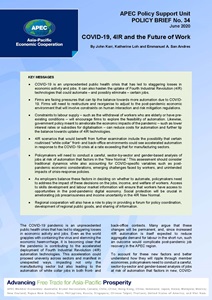COVID-19, 4IR and the Future of Work

| Published Date | June 2020 |
|---|---|
| Type of Publication | Reports |
| Publication Under | APEC Secretariat, APEC Policy Support Unit |
| Accessed | 15618 |
| Pages | 9 |
| Download publication | Download |
Description
Key messages from this policy brief are:
- COVID-19 is an unprecedented public health crisis that has led to staggering losses in economic activity and jobs. It can also hasten the uptake of Fourth Industrial Revolution (4IR) technologies that could automate – and possibly eliminate – certain jobs.
- Firms are facing pressures that can tip the balance towards more automation due to COVID-19. Firms will need to restructure and reorganise to adjust to the post-pandemic economic environment that will involve constraints on human interaction and risk mitigation regulations.
- Constraints to labour supply – such as the withdrawal of workers who are elderly or have pre-existing conditions – will encourage firms to explore the feasibility of automation. Likewise, government policy meant to ameliorate the economic impacts of the pandemic – such as lower interest rates or subsidies for digitalisation – can reduce costs for automation and further tip the balance towards uptake of 4IR technologies.
- 4IR scenarios that would benefit from further examination include the possibility that certain routinised “white collar” front- and back-office environments could see accelerated automation in response to the COVID-19 crisis at a rate exceeding that for manufacturing sectors.
- Policymakers will need to conduct a careful, sector-by-sector and gender-based analysis of jobs at risk of automation that factors in the “New Normal.” This assessment should consider traditional dynamics while also accounting for COVID-specific variables such as post-pandemic economic considerations, emerging challenges faced by workers, and unintended impacts of crisis-response policies.
- As employers balance these factors in deciding on whether to automate, policymakers need to address the impact of these decisions on the jobs, income, and welfare of workers. Access to skills development and labour market information will ensure that workers have access to opportunities in the post-pandemic digital economy. Social protection will be crucial in ameliorating job precariousness and income uncertainty in the 4IR New Normal.
- Regional cooperation will also have a role to play in providing a forum for policy coordination, development of regional public goods, and sharing of information.

